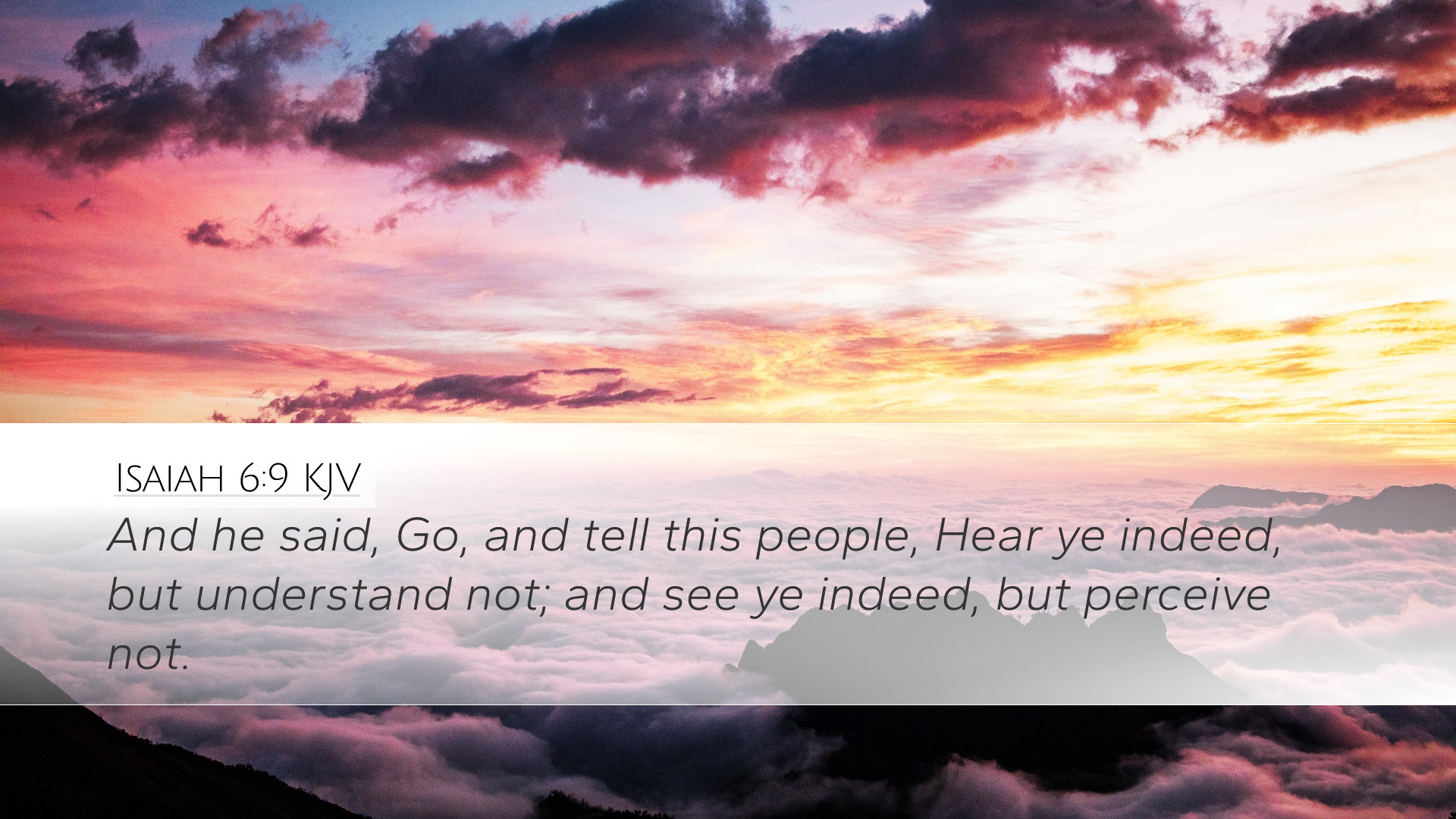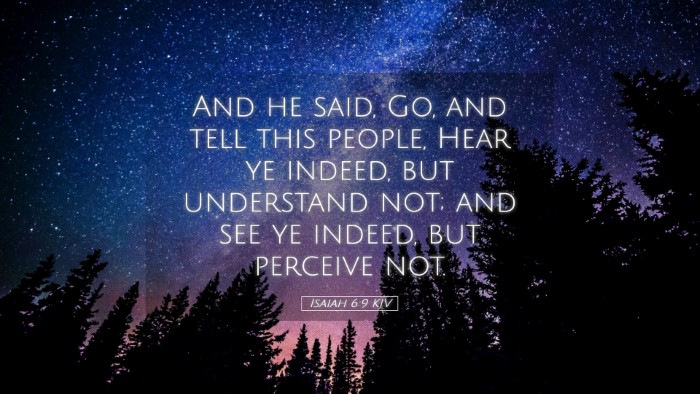Commentary on Isaiah 6:9
Introduction
Isaiah 6:9 presents a pivotal moment in the prophet Isaiah's call and commissioning. The verse serves as a divine instruction to Isaiah about his prophetic mission and underscores the broader theme of spiritual blindness among the people of Israel. This commentary consolidates insights from notable public domain commentators such as Matthew Henry, Albert Barnes, and Adam Clarke to provide a comprehensive understanding of this essential scripture.
Understanding the Context of Isaiah 6:9
The chapter begins with a dramatic vision of God’s holiness and a heavenly encounter that profoundly impacts Isaiah. In the midst of his vision, Isaiah volunteers for God's service after his own sins are atoned for. However, the instructions he receives in Isaiah 6:9 reveal the daunting nature of his ministry. God commands Isaiah to go and speak to the people but forewarns him about their deafness and blindness to the truth.
Diving into Isaiah 6:9
Text: "And He said, 'Go, and tell this people: “Keep on hearing, but do not understand; Keep on seeing, but do not perceive.”'"
Isaiah's Commission
Isaiah is given a direct mandate to deliver a message to the people of Israel. As Albert Barnes notes, the repetition of hearing and seeing emphasizes the people's failure to grasp God's word and reality. Their condition is one of relentless rejection and misunderstanding, a spiritual malaise caused by rebellion against God.
The Significance of “Hearing” and “Seeing”
- Spiritual Blindness: As Matthew Henry articulates, the phrase “Keep on hearing, but do not understand” indicates a profound spiritual blindness that hinders the people from truly knowing God. This blindness is rooted in their obstinacy and unwillingness to respond to divine revelation.
- Divine Judgment: Adam Clarke elaborates that this selective hearing and seeing serves as a form of divine judgment. The people's continuing rebellion results in God allowing them to remain in their ignorance, effectively sealing their fate. Their lack of responsiveness has consequences, including withdrawal from God's grace and insight.
- Revelation and Responsibility: Despite their spiritual dullness, the continued presentation of God’s message serves to hold the people accountable. Henry suggests that the divine message is both an act of grace and a challenge, aiming to provoke thought and ultimate repentance, though unlikely.
Applications for Today
This verse extends beyond its historical context, providing profound lessons for contemporary readers, including pastors, students, theologians, and scholars:
- Responsibility of Preaching: Pastors are reminded of the inherent challenge in proclaiming the gospel. Like Isaiah, they must faithfully communicate God’s truth, even when faced with apathy or resistance from their congregations.
- Spiritual Discernment: It serves as a call for believers to seek spiritual discernment. The faithful should not only hear and see but actively pursue understanding and application of God’s word in their lives.
- God's Sovereignty in Spiritual Awareness: This passage also emphasizes God's sovereignty over the human heart. Clarke comments on God’s control over the spiritual condition of nations. This invites theological reflection on God’s role in revelation and human response.
Theological Reflections
The implications of Isaiah 6:9 must not be understated. This scripture invites deep theological reflection on themes of human depravity, the nature of divine revelation, and the responsibility of both the messenger and the recipients of God’s word.
Human Depravity: The ongoing theme of human incapacity to respond to divine truths speaks to the total depravity of man, a Augustine belief echoed by many theologians. This emphasizes the need for divine intervention for any spiritual awakening.
Nature of Revelation: The nature of God’s revelation is multi-dimensional, where auditory and visual elements are not just physical experiences but spiritual realities requiring action. This invites biblical scholars to delve into the correlation of physical senses and spiritual understanding.
Divine Sovereignty: The verse ultimately affirms God’s sovereignty. God’s declaration about the people’s condition is stark and unyielding. This invites reflection on predestination and the nature of God's grace, which resonates throughout biblical theology.
Conclusion
Isaiah 6:9 captures the essence of Isaiah's mission and the tragic state of the people of Israel. By discussing the spiritual blindness and deafness of the people, God reinforces the seriousness of the calling Isaiah has received. By studying this verse and its implications, pastors, students, theologians, and scholars can gain a deeper appreciation of the challenges of prophetic ministry and the persistent call to turn towards God amidst overwhelming odds.


